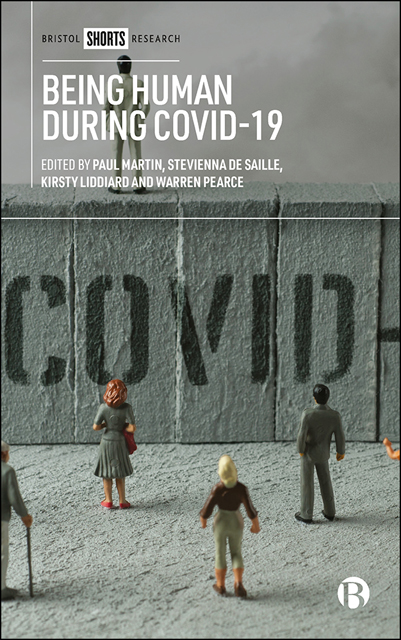two - Pandemics, Metaphors and What It Means to Be Human
Published online by Cambridge University Press: 13 October 2022
Summary
Knowledge and human knowledge
Knowledge and metaphor go hand in hand. We create and expand knowledge through metaphors and we need knowledge to understand metaphors. Metaphors are crucial to the production of knowledge, as they allow humans to make connections between what is already known and thinkable and what is not yet known and neither thinkable nor sayable. By mapping meaning from one domain of knowledge or perception onto another, metaphors create new meaning. This includes knowledge of what it means to be human.
The ability of metaphor to make us see things in certain ways, and from there to understand and explain them, is fundamental to seeing, understanding and dealing with unknown and invisible phenomena. At the end of 2019 a new virus, severe acute respiratory syndrome coronavirus 2 (SARS-CoV-2) emerged in China, with the World Health Organization declaring the associated disease, COVID-19, a pandemic on 11 March 2020. As early as 21 January, the US Centers for Disease Control asked a science illustrator to provide an image of the virus. This image of a spikey ball, and many others like it, spread around the world and became one of the first ways in which people came to know the virus and the pandemic.
The spikey ball inspired numerous subsequent images, as well as many polemical takes on how politicians had failed to deal with the virus. This chapter outlines how two heavily criticized leaders, former US President Donald Trump and UK Prime Minister Boris Johnson, used metaphors to shape a verbal image of the virus that served their political purposes.
All knowledge is political but some is more political than the rest. Metaphors play an important role in bringing knowledge and politics together, but can enhance ignorance as well as understanding.
Metaphors that make us less human
In April 2020, former President Trump started to repeatedly use a familiar and worrying metaphor, describing the virus as the ‘invisible enemy’ (Chan, 2020): ‘In light of the attack from the Invisible Enemy, as well as the need to protect the jobs of our Great American Citizens, I will be signing an Executive Order to temporarily suspend immigration into the United States’.
- Type
- Chapter
- Information
- Being Human during COVID-19 , pp. 20 - 27Publisher: Bristol University PressPrint publication year: 2022



